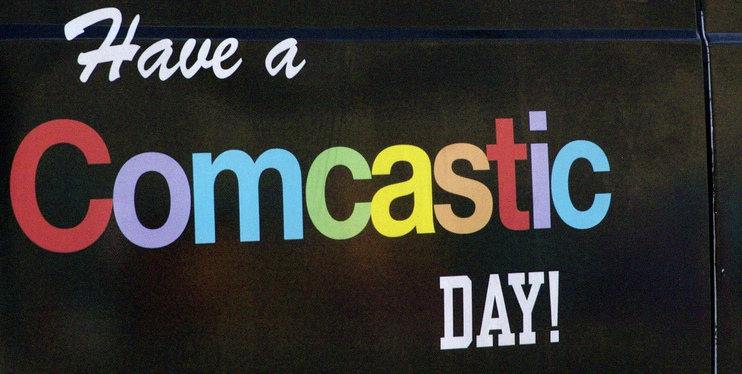Antitrust Experts To FCC: Comcast/TWC Merger Is A Terrible Idea
DSL Reports points to the letter (PDF). In it, the experts focus on four major buckets of issues, but they all boil down to one core idea about broadband competition.
Namely: there is already isn’t really any, and the merger will make it worse.
The letter cites FCC chairman Tom Wheeler’s own data about broadband competition, pointing out that at actual speeds of 25 Mbps or higher — which, Wheeler has argued, should be the new “table stakes” minimum for high-speed broadband — most folks have only one provider to choose from, if that.
And not only is competition already dire, the letter continues, but “new entry” is basically impossible. Google Fiber has only a tiny presence so far, despite Comcast claiming them as a competitor, and Comcast is actively trying to block publicly-owned entrants from starting up.
The antitrust experts also point out that although Comcast waves away claims about their potential national dominance by saying that local markets are what matter, the national market share has in fact been a significant issue before. Back in 2000, broadband providers AT&T and MediaOne tried to merge. The DoJ blocked that merger, arguing that the resulting company would be anticompetitive.
But here’s the real kicker: the companies and assets involved in that transaction almost 15 years ago haven’t gone away, they’ve just changed hands. Specifically, as the letter points out (emphasis added):
“[T]he Road Runner broadband assets in question in 2000 remain Time Warner Cable’s to this day, while AT&T’s broadband assets were subsequently transferred to Comcast. Thus, the proposed Comcast/Time Warner Cable merger would combine the very broadband assets that DOJ blocked from combining in 2000.”
The courts, including the Justice Department, are all about looking at previous case law for guidance. If the same merger was too big for competition in 2000, it’s probably still too big today.
The experts also call shenanigans on Comcast and TWC’s constant drumbeat that they don’t compete in any of the same geographic areas now. It’s true, as far as that goes, but it also doesn’t matter. The lack of geographic competition “cannot serve as a basis for foregoing further antitrust analysis,” the letter continues, because “if it were otherwise, the antitrust laws would allow the formation of a single cable company serving virtually the entire United States, a result that would be completely at odds with sound antitrust enforcement.”
In the end, Comcast is using arguments that have worked for previous cable mergers. But this one, the experts in the law are saying here, really is different. The present we live in used to just be an imagined future on the far horizon of “someday when the internet works better.” But here and now, our realities are genuinely apart from what they were five, fifteen, or fifty years ago.
Traditional pay TV (cable and satellite) are now in a direct stand-off against online, over-the-top TV. These are genuinely competing forces, but because of the vertical and horizontal integration of existing companies, Comcast — which is a pay TV company and a broadband company and a content company — has the ability and the incentive to try to block new or expanding players in any direction.
Any benefits from the merger, the letter concludes, aren’t limited to the merger. Comcast and Time Warner Cable could keep doing things like expanding internet access for low-income families or improving their customer service without becoming one monolith. And the potential for consumer harm, as we’ve seen time and time and time again, is just too big to ignore.
More Than 30 Antitrust Experts Slam Comcast Merger [DSL Reports]
Want more consumer news? Visit our parent organization, Consumer Reports, for the latest on scams, recalls, and other consumer issues.


